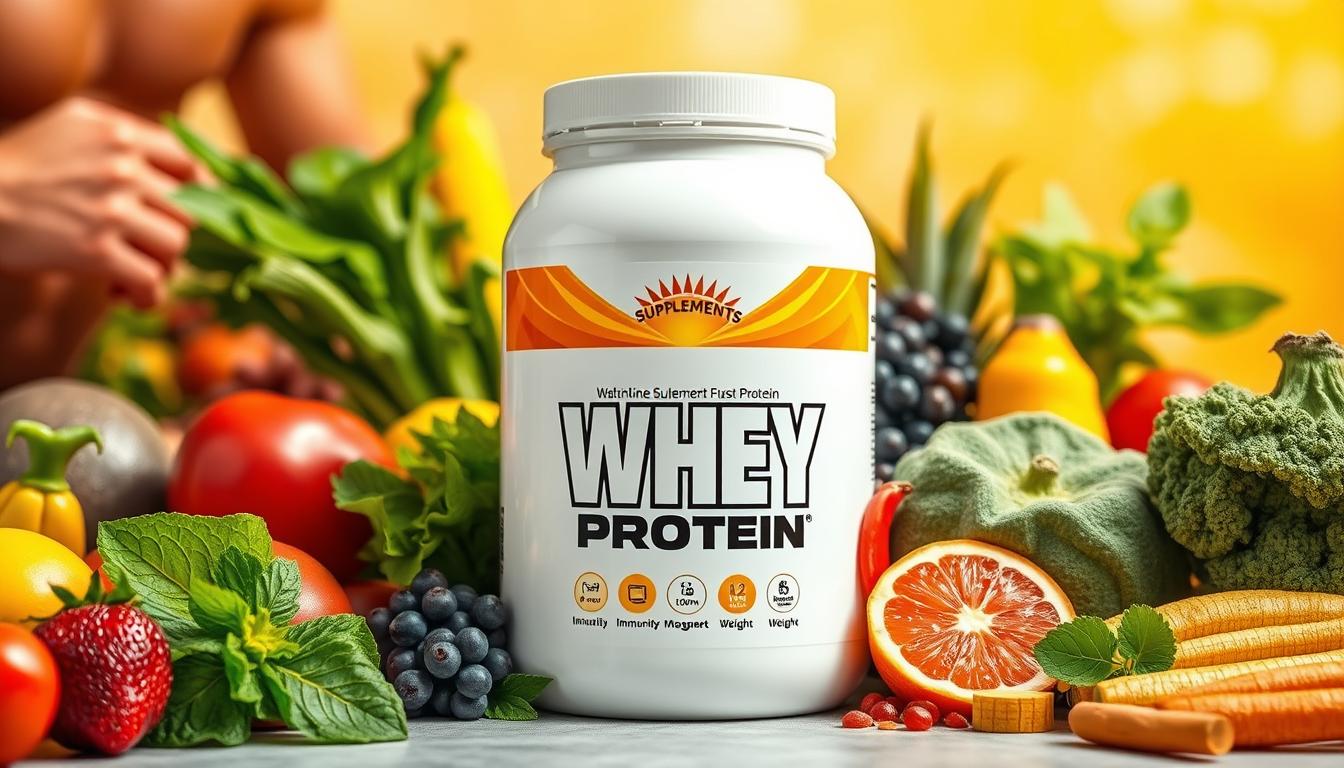Did you know whey protein is a byproduct of cheese making? It makes up 20% of milk’s protein. This supplement is loved by many for its health benefits. It’s full of nine essential amino acids.
Whey protein can help you build lean muscle, boost your immune system, and even improve heart health. It’s a game-changer for your fitness and health goals.
Key Takeaways
- Whey protein is a complete protein that contains all nine essential amino acids
- It supports muscle growth, recovery, and physical performance
- Whey protein can aid in weight management by increasing satiety and reducing calorie intake
- It boosts immune system function and protects against inflammation
- Whey protein promotes better digestive health and nutrient absorption
Understanding Whey Protein: A Natural Powerhouse
Whey protein comes from cheese making. It’s a liquid full of nutrients that boost health and fitness. It’s a natural supplement that’s very beneficial.
How Whey Protein Is Made
Whey protein is the liquid part from cheese making. It’s separated from solid casein curds. Through filtering and purification, it becomes a protein supplement.
Types of Whey Protein Available
There are many types of whey protein. Each has its own special features:
- Whey Protein Concentrate (WPC) – Has 70-80% protein, with 20% lactose and fat.
- Whey Protein Isolate (WPI) – Has 80-95% protein, with less fat and lactose.
- Whey Protein Hydrolysate (WPH) – Is partially pre-digested, making it easy to absorb.
Key Nutrients in Whey Protein
Whey protein is known for its nutrient-rich profile. It has essential amino acids, immunoglobulins, and antioxidants. Leucine, in particular, helps grow muscles.
| Nutrient | Benefit |
|---|---|
| Leucine | Stimulates muscle protein synthesis, promotes muscle growth |
| Immunoglobulins | Strengthens the immune system and reduces the risk of infections |
| Antioxidants | Helps fight inflammation and oxidative stress |
Whey protein is easily absorbed by the body. It’s great for muscle recovery, endurance, and athletic performance.
Benefits of Whey Protein for Muscle Growth and Recovery
Whey protein is a nutritional powerhouse for muscle growth and recovery. It has all the essential amino acids your body needs. This makes it perfect for fueling your fitness goals.
Essential Amino Acid Profile
Whey protein is a complete protein. It has all the essential amino acids your body needs. This is key for muscle growth because it gives your muscles the building blocks they need.
Post-Workout Recovery Benefits
Whey protein is quickly absorbed. This lets your muscles get the post-workout recovery nutrients they need fast. Drinking whey protein after a workout helps your body repair and rebuild muscle fibers. This leads to increased strength and lean muscle mass.
Protein Synthesis Enhancement
Whey protein boosts protein synthesis. This is how your body makes new muscle proteins. By increasing protein synthesis, whey protein helps you build lean muscle mass when you’re doing resistance training.
Studies show that adding whey protein to your fitness routine can improve muscle growth, recovery, and performance. Adding this powerful nutrient to your diet can change the game for your fitness and muscle-building goals.

“Whey protein is a game-changer for muscle growth and recovery. Its complete amino acid profile and ability to boost protein synthesis make it a must-have for fitness enthusiasts and athletes.”
Weight Management and Appetite Control
Whey protein is a great tool for weight loss. It offers many benefits that help manage weight and control hunger. Adding whey protein to your diet and workout routine can help you lose fat while keeping your lean body mass.
Whey protein makes you feel full, which is key for weight management. It’s satiating, meaning it helps you eat fewer calories. Studies show it reduces hunger and cravings, helping those who are overweight or obese.
The amino acids in whey protein, like BCAAs, are important. They trigger hormones that tell your brain you’re full. This leads to feeling satisfied for longer and less likely to overeat.
Whey protein also has a high thermic effect. This means your body burns more calories when digesting it. This can increase your metabolic rate, helping you burn more calories all day and aiding in weight loss.
| Benefit | Description |
|---|---|
| Increased Satiety | Whey protein can help reduce hunger and food cravings, making it easier to stick to your weight loss plan. |
| Enhanced Metabolism | The high thermic effect of whey protein can boost your metabolic rate, leading to greater calorie burning. |
| Muscle Preservation | Whey protein supports the maintenance of lean muscle mass during weight loss, preventing a drop in metabolic rate. |
Using whey protein can help you reach your weight loss goals and keep your lean body mass. Adding it to your diet and workout routine makes you feel fuller, burns more calories, and keeps your muscle. This sets you up for success in managing your weight for the long term.

Supporting Immune System Function
Whey protein is more than just for muscle building and recovery. It also boosts your immune system. It has special compounds that help your body fight off sickness and infection.
Immunoglobulins and Their Role
Whey protein is full of immunoglobulins, important for your immune health. These antibodies fight off viruses and bacteria. They help keep you healthy and strong.
By eating whey protein, you help make more of these vital antibodies. This strengthens your immune system.
Antioxidant Properties
Whey protein has antioxidants like glutathione. They fight oxidative stress and inflammation. This keeps your immune system strong.
By fighting free radicals, whey protein helps your body stay healthy. This leads to better overall health and resilience.
Fighting Inflammation
Chronic inflammation weakens your immune system and causes health problems. Whey protein can lower inflammation markers like C-reactive protein. This helps manage inflammatory conditions.
By reducing inflammation, whey protein supports your immune system. It promotes overall wellness.

Adding whey protein to your diet can boost your immune system. It helps fight off illnesses, supports your body during stress, and keeps you strong against infections. Whey protein is a great ally for a strong immune system.
Digestive Health and Nutrient Absorption
Whey protein is more than just for muscle growth and recovery. It also boosts your digestive health. The amino acids in whey, like threonine and cysteine, help keep your gut healthy. They might even help those with inflammatory bowel conditions.
Whey protein helps protect your gut lining by making more mucin. This lining is key for nutrient absorption and digestive health. Plus, whey is easier to digest than other proteins, great for sensitive stomachs.
The gut protection benefits of whey protein go beyond the gut lining. It has immunoglobulins and lactoferrin that boost your immune cells. This strengthens your body’s defenses, supporting your digestive and immune systems.
| Whey Protein Type | Protein Content |
|---|---|
| Whey Protein Concentrate (WPC) | 70-80% protein |
| Whey Protein Isolate (WPI) | 90% protein |
| Hydrolyzed Whey Protein | Varies in concentrations |
Adding whey protein to your diet can change the game for your digestive health and nutrient absorption. It supports a healthy gut and boosts your body’s defenses. This can improve your overall well-being and help you thrive.

Blood Pressure and Heart Health Benefits
Whey protein is a byproduct of cheese making. It’s good for your heart. Studies show it can lower blood pressure and improve heart health.
Cardiovascular Protection
A 2023 study in Nutrition, Metabolism, & Cardiovascular Diseases found whey protein lowers blood pressure. This is key, as high blood pressure affects many Americans. It increases the risk of stroke and heart attack, says the Centers for Disease Control and Prevention.
Blood Pressure Regulation
Whey protein helps control blood pressure. It keeps blood vessels healthy. This supports overall heart health and keeps blood pressure normal.
Cholesterol Management
Whey protein also helps with cholesterol. A 2020 review of 22 studies showed it lowers triglycerides, total cholesterol, and LDL cholesterol. This is good for heart disease prevention.
Adding whey protein to your diet can help with blood pressure, heart health, and cholesterol management.
Enhanced Athletic Performance and Endurance
Whey protein is a game-changer for athletes. It’s a complete protein with essential amino acids. These are key for muscle growth, repair, and recovery.
Whey protein is quickly absorbed. This means your muscles get amino acids fast. This helps them recover and rebuild after hard workouts. It boosts muscle strength, power, and endurance over time.
Research shows endurance athletes need 1.2 to 1.4 grams of protein per kilogram of body weight daily. Strength-trained athletes need 1.6 to 1.7 grams. Whey protein helps athletes meet these needs, keeping lean muscle and boosting performance.
Studies also found that protein and carbs together improve endurance. This mix optimizes energy, muscle glycogen, and recovery between workouts.
“Consuming protein-plus-carbohydrate beverages after intense exercise accelerates recovery, leading to improved performance later on.”
Whey protein is great for runners, weightlifters, and cyclists. It supports muscle repair, growth, and endurance. This helps you reach your athletic goals.
Quality and Sourcing: Grass-Fed vs. Conventional Whey
Whey protein comes from different sources and methods. Grass-fed whey, made from cows eating grass, has many benefits. It’s better than conventional whey in many ways.
Environmental Impact
Grass-fed dairy farming is better for the environment. Cows eating grass need less grain and supplements. This makes their farming more sustainable.
This fits with the trend towards sustainable farming. It cares for animals and the planet.
Nutritional Differences
Grass-fed whey is more nutritious than regular whey. It has more omega-3 fatty acids, antioxidants, and vitamins. It’s a better choice for ethical protein.
Research shows it’s also easier to digest. This is good for people with sensitive stomachs or lactose intolerance.
Ethical Considerations
Cows for grass-fed whey are treated better. They don’t get synthetic hormones or antibiotics. This is a big difference from regular dairy farming.
Choosing grass-fed whey protein helps local farmers. It supports a healthier food system.
When picking whey protein, think about where it comes from. Grass-fed whey is better for you and the planet. It’s a top choice for quality and sustainability.
Conclusion
Whey protein is a powerful supplement that boosts your health and fitness. It helps grow muscles, aids in recovery, and supports weight management. It also strengthens your immune system.
When picking a whey protein, look at its quality, where it comes from, and what it offers. Grass-fed whey, for example, might be better for the environment and your health. Adding whey protein to your diet can help you reach your benefits of whey protein, muscle growth, and overall health goals.
Remember, getting healthier is a journey, and whey protein can help. Use this versatile supplement to reach your health and fitness goals.




